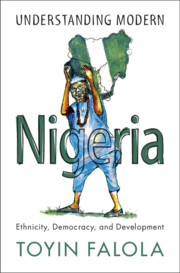Book contents
- Understanding Modern Nigeria
- Understanding Modern Nigeria
- Copyright page
- Dedication
- Contents
- Figures
- Maps
- Preface
- Acknowledgments
- Part I Introduction
- Part II Context and History
- Part III Democracy and Governance
- Part IV Development Crises
- Part V Reforms and Revolutions
- 19 Change Agents: Youths and Politics
- 20 Hashtags and Social Protests: Reformation and Revolution in the Age of Social Media
- 21 Reformist Option: Grassroots and Political Activism
- 22 Revolutionary Option: Social Movements and Power to the Citizens
- 23 Nationalist Ethos, Collective Reformation, and Citizenry Power
- 24 Popular Culture and Politics
- Part VI Conclusion
- Bibliography
- Index
19 - Change Agents: Youths and Politics
from Part V - Reforms and Revolutions
Published online by Cambridge University Press: 09 June 2021
- Understanding Modern Nigeria
- Understanding Modern Nigeria
- Copyright page
- Dedication
- Contents
- Figures
- Maps
- Preface
- Acknowledgments
- Part I Introduction
- Part II Context and History
- Part III Democracy and Governance
- Part IV Development Crises
- Part V Reforms and Revolutions
- 19 Change Agents: Youths and Politics
- 20 Hashtags and Social Protests: Reformation and Revolution in the Age of Social Media
- 21 Reformist Option: Grassroots and Political Activism
- 22 Revolutionary Option: Social Movements and Power to the Citizens
- 23 Nationalist Ethos, Collective Reformation, and Citizenry Power
- 24 Popular Culture and Politics
- Part VI Conclusion
- Bibliography
- Index
Summary
“Change Agents: Youths and Politics” examines the contribution of youths, active and otherwise, to Nigerian politics, and eventually to the development of its society as young people are variously described as strong, virile, and teachable, and generally have longer lifespans. However, the increase in unemployment, poverty, lack of access to education and health facilities etc., are factors that suppresses the productivity of the Nigerian youths. These factors also endanger the progress and peace of the nation in general, as the burgeoning rise in the number of youths unengaged is a threat to the stability and progress of the nation. Hence, structured care and training for the young yields profit in the form of self-actualization for the individual, and growth and stability for the family unit and the country. When youths are strengthened with the necessary education, healthcare, and other interventions for optimal growth, the nation is on a path to collective development. Also, this discourse examines the (paradoxical) relation of the youths to the development of the nation: how the meaningful involvement of the youth with Nigerian politics is hindered, denied, or overlooked; how Nigerian youths are exploited as mechanisms by the elites to perpetrate political violence; and how government policies continue to result in political apathy among the youths despite being the larger percentage of the nation’s population.
- Type
- Chapter
- Information
- Understanding Modern NigeriaEthnicity, Democracy, and Development, pp. 451 - 482Publisher: Cambridge University PressPrint publication year: 2021

